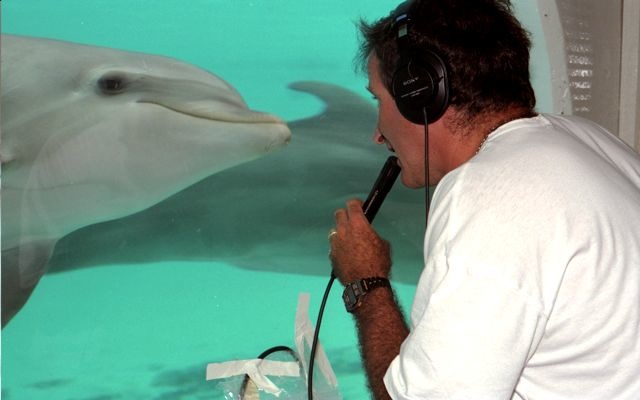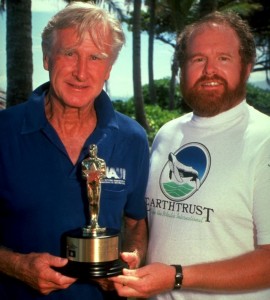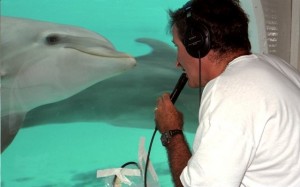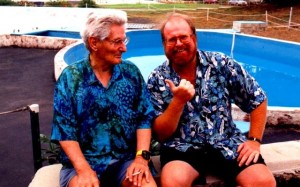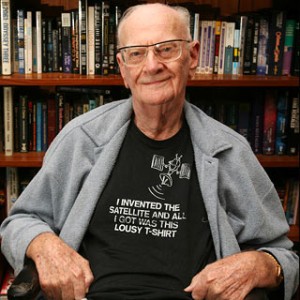Educating the World about the Reality of Whales since 1976
We’ve had the chance to know a lot of great people while helping the world know whales.
A messaged from ET president DJ White:
Hi there! Watch this site…. we have a whale-sized trove of educational information on whales to put up at this new website, and it’ll take as long as it takes. We literally have rows of file cabinets full of unique history, biology, and stories about whales and whaling; and hundreds of hours of original ET video content to migrate to digital format and put up here. (If you’ve ever wanted to volunteer long hours dubbing and digitizing video, we’ve got a great job for you!)
Lloyd & DJ with a first-place film festival award for “WhaleSong; Whales and Dolphins of the Pacific”
Education has been a pleasure, a passion, and a necessary strategy for ET and STWI since our start in 1976. At that time, people knew almost nothing about whales which wasn’t discovered by cutting them up. The very first underwater footage, shot by pioneers like Jim Hudnall, was showing whales to be amazing, complex, streamlined and sophisticated beings, and not just the floating lumps of meat they had seemed to be. Educating the world about the reality of whales became vital in the attempt to prevent their eradication. And it was a grim time, starting out, because saving any of them at all seemed a huge long shot.
We’ve been lucky enough to play a role in the transformation of whales in human culture; and that transformation needs to continue.
The reality of whales still bowls me over. As you read this, there are real living creatures with brains many times the size of your own who are over 200 years old, thinking thoughts we can’t even guess at beneath polar ice. If we found such creatures on a moon of jupiter, it would transform our view of the universe, and we would seek to know what they know. But since they’re vulnerable and unlike us, and we have a tradition of killing them off, we value them only as a source of spare meat, as human and dogfood which is not needed except ceremonially.
Educating the world about whales has meant learning a lot ourselves, and getting to know some great humans who have worked with us. Astronauts, authors, futurists, musicians, filmmakers, computer industry scientists, biologists, and many others.
Robin Williams at Project Delphis
Personally, I wore two hats as director of EarthTrust and as a leader in the Greenpeace movement from ’76-85, so I lived through and helped steer some very dramatic teaching opportunities for the world of whales, alongside some of the early titans of the whale-saving movement. That experience help me make the decisions in steering ET and STWI when I made them my full-time vehicle in 1985 and beyond.
Remember the Star Trek whale movie? That teaching opportunity started on my typewriter keyboard, pitching Paramount suggestions for a whale-centric plotline; and it progressed to my setting up Mark and Debbie Ferrari as their whale experts for the film. I really liked the way that movie came out.
Remember Dr. John Lilly, the fellow who was the real-life basis for the movie “Altered States”? Reading his books about cetacean intelligence challenged me and excited me back in the early ’70’s. Yet as the years rolled on, even some of his more outlandish-seeming speculations took on a certain plausibility. I met John in ’79 and he would up moving to Maui and becoming an involved contributor to several ET projects (Particularly the Delphis project, which he considered the heir to his own work on dolphin intelligence). So ET was well-connected with the most “out there” whale scientist; yet the same project had Dr. Ken Norris, the world’s most respected dolphin expert, as an advisor and supporter.
John Lilly taking a smoke break at the Delphis lab
Our international board was run until shortly before his death by no less a teacher than Sir Arthur C. Clarke, who also supported our projects financially, and loved the “documentary factory” for whales & dolphins we had created, injecting new knowledge about the cetaceans into world culture by drawing independent documentary makers to us, from local stories to IMAX filming.
Arthur Clarke dedicated his time and funding to the ET approach to research and education. Because the reality of whales and dolphins is about the closest thing there is to real-world SciFi.
And could we have had a better spokesman for the whales and dolphins than Lloyd Bridges, Mr. “Sea Hunt”? Lloyd appeared in many of our educational video productions and lent his sincerity and caring to many projects; as well as hosting an annual pro-whale benefit on Maui each year with he and his family helping spread the word about whales.
It has been amazing to meet and get to know hundreds of celebrities, scientists, and other humans who have volunteered their time to help us tell the story. But it has been even more amazing to get to know cetaceans on a closer level. To have experienced back-and-forth communication with the mind of a dolphin, to have held a young humpback whale in the surf and hear its vocalizations, feel it’s mighty breathing flesh-to-flesh. They’re real people; different from us but not inferior. It could take us thousands of years to even partially understand them, and I want them, and us, to have that chance.
It’s insanely cool that convergent evolution placed other races of self-aware, intelligent beings on our planet. It is just insane that we are well along the road to wiping them all out.
I can feel good that ET’s efforts and my own have saved thousands of whales and millions of dolphins from a more immediate death; and that credit goes to all of you who have donated to ET and STWI to make that possible. There has never been an advocacy group which has saved more cetacean lives through education and through direct intervention.
But as with the saving of any lives, the victory is only temporary. Now in addition to the many curses we have visited upon the whales, we are acidifying the seas with our CO2, returning them to oceans of primordial slime which will have no place for animals like whales and dolphins. They will mostly be doomed within 50 years of business as usual, and pretty much nobody yet understands this. So the biggest challenge of all for whale education will be in conveying to the world that there is a choice to be made, and the whales and dolphins are representatives of what we stand to lose as we lose the seas we and they evolved with.
Join with us to help get this across… and watch this space for video, stories, and other content as we digitize and move content over!
– DJ White, president & founder, EarthTrust and Save the Whales Intl.

